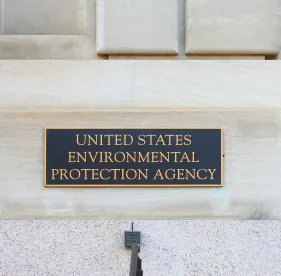The EPA’s controversial science adviser policy has suffered two more defeats following the recent Union of Concerned Scientists v. Wheeler decision, making three straight losses in court for the Trump Administration’s policy limiting scientist participation in U.S. Environmental Protection Agency advisory boards.
Over the last two weeks, two courts – one, a New York district court and the second, the U.S. Court of Appeals for the D.C. Circuit – have found against the EPA on the same issue. The upshot of all of these decisions is that the EPA will likely be forced to consider scientists who receive EPA grants for openings on its advisory committees.
As further background, the EPA has long relied upon advisory committees comprising members from the scientific community to advise the EPA on the development and implementation of regulations. But in October 2017, the EPA issued an executive directive precluding most EPA grant recipients from being members of its advisory committees, ostensibly to avoid potential financial conflicts of interest. That policy has drawn multiple legal challenges from plaintiffs who argue it unlawfully favors industry-affiliated scientists and disqualifies many of the most knowledgeable scientists in their fields.
Southern District of New York Vacates and Remands Science Adviser Policy to EPA
On April 15, a Southern District of New York judge ruled against the EPA in NRDC v. Wheeler, vacating the EPA’s science adviser policy and remanding it to the agency. The court had previously ruled that the directive violated the Administrative Procedure Act (APA), because the EPA had failed to justify its decision to change its longtime practice of allowing EPA grant recipients to be members on EPA advisory committees. In the April 15 decision, the court rejected arguments by the EPA that the policy should remain in place while the EPA seeks a new justification for it. In vacating the policy, the court noted that the “EPA’s deficiencies in instituting the Directive were serious.” While the court’s ruling does not require the EPA to reopen the composition of any particular advisory committee, it bars the EPA from using the policy to categorically exclude EPA grant recipients from serving on its advisory committees in the future.
D.C. Circuit Decides EPA Failed to Provide Reasonable Explanation for Policy Shift
In the D.C. Circuit decision, Physicians for Social Responsibility, et al. v. Wheeler, the court ruled that the EPA had violated the APA, because it failed to adequately justify the science adviser policy. The court noted that agencies must offer a reason when departing from prior precedents or practices and characterized the science adviser directive as “a major break from the agency’s prior policy.” The directive contained “not a peep” about prior policies permitting the EPA grant recipients to be members of advisory committees and therefore failed to provide the explanation required by the APA.




 />i
/>i

